深港版六年级英语1-3单元短语
六年级上册英语1~3单元重点知识
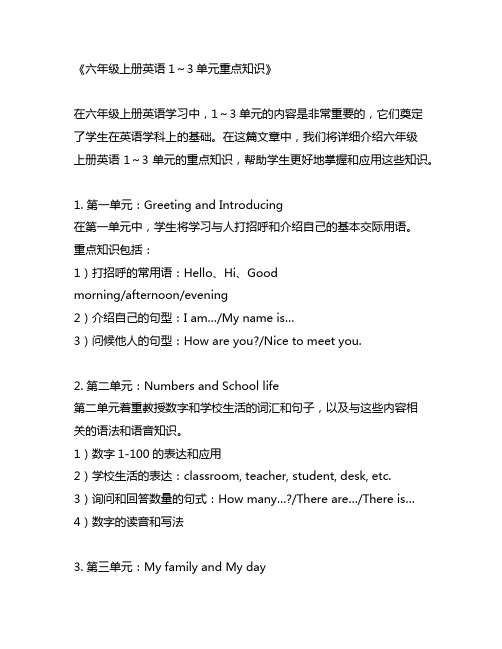
《六年级上册英语1~3单元重点知识》在六年级上册英语学习中,1~3单元的内容是非常重要的,它们奠定了学生在英语学科上的基础。
在这篇文章中,我们将详细介绍六年级上册英语1~3单元的重点知识,帮助学生更好地掌握和应用这些知识。
1. 第一单元:Greeting and Introducing在第一单元中,学生将学习与人打招呼和介绍自己的基本交际用语。
重点知识包括:1)打招呼的常用语:Hello、Hi、Goodmorning/afternoon/evening2)介绍自己的句型:I am…/My name is…3)问候他人的句型:How are you?/Nice to meet you.2. 第二单元:Numbers and School life第二单元着重教授数字和学校生活的词汇和句子,以及与这些内容相关的语法和语音知识。
1)数字1-100的表达和应用2)学校生活的表达:classroom, teacher, student, desk, etc.3)询问和回答数量的句式:How many…?/There are…/There is…4)数字的读音和写法3. 第三单元:My family and My day在第三单元中,学生将学习如何描述自己的家庭和日常生活。
重点内容包括:1)家庭成员的称呼:father, mother, brother, sister, etc.2)家庭成员关系的表达:This is my…/She is my…3)日常生活的描述:get up, have breakfast/lunch/dinner, go to bed, etc.4)时间的表达和描述:morning, afternoon, evening, etc.以上是六年级上册英语1~3单元的重点知识,掌握这些知识对于学生来说是非常重要的。
在学习过程中,学生应该注重听、说、读、写的综合训练,同时注重语言环境的营造,培养学生的英语思维和表达能力。
深港版六年级Unit 1 Being polite
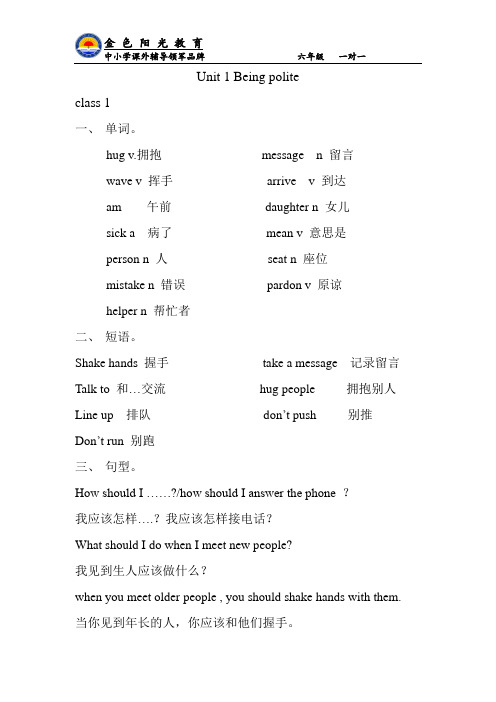
Unit 1 Being politeclass 1一、单词。
hug v.拥抱message n 留言wave v 挥手arrive v 到达am 午前daughter n 女儿sick a 病了mean v 意思是person n 人seat n 座位mistake n 错误pardon v 原谅helper n 帮忙者二、短语。
Shake hands 握手take a message 记录留言Talk to 和…交流hug people 拥抱别人Line up 排队don’t push 别推Don’t run 别跑三、句型。
How should I ……?/how should I answer the phone ?我应该怎样….?我应该怎样接电话?What should I do when I meet new people?我见到生人应该做什么?when you meet older people , you should shake hands with them. 当你见到年长的人,你应该和他们握手。
四、读一读。
1.我应该怎样去见陌生人呢?What should I do when I meet new people?2.我应该和他们交谈吗? 是的,你应该.Should I talk to them? Yes, you should.3.我应该拥抱陌生人吗? 不,你不能.Should I hug them? No, you shouldn’t.4.当你等候公车的时候,你必须排队。
When you wait for a bus, you should line up.5.当你等候公车的时候,你不应该推人或跑。
When you wait for a bus, you shouldn’t push or run.6.当我遇见新朋友的时候我要做什么呢?What should I do when I meet new people?7.当你遇见年老的人的时候,你要和他们握手和说话.When you meet older people, you should shake hands with them and say, “Hello”.8.当你见年轻人的时候,你可以一边挥手一边说”你好”.When you meet young people, you should wave and say ,“Hello”. 9.当我们第一次见新朋友的时候我们通常不拥抱他们.We don’t hug people when we meet them the first time.10.当家人不在家的时候,我应该怎样接电话呢?How should I answer the phone when the family isn’t at home?11.我能为你记下留言吗?Can I take a message (for you)?12.我的火车明天早上10点到达.My train arrives at 10:00 am tomorrow.13.当你犯了一个错误的时候,你应该说“对不起”.When you make a mistake, you should say “Sorry”.Class 2五、语法学习:1.when 引导的时间状语从句;2.when的含义:当什么的时候;3.主从句为一般现在时;六、短文。
六年级英语上册1-3单元知识点归纳
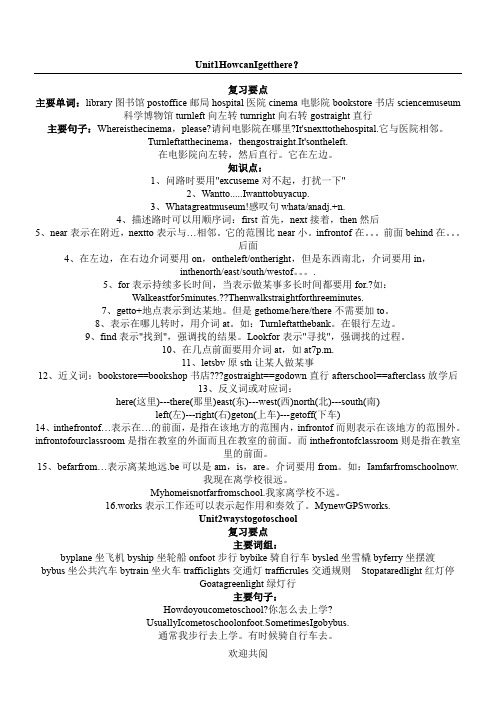
Unit1HowcanIgetthere?复习要点主要单词:library图书馆postoffice邮局hospital医院cinema电影院bookstore书店sciencemuseum 科学博物馆turnleft向左转turnright向右转gostraight直行主要句子:Whereisthecinema,please?请问电影院在哪里?It'snexttothehospital.它与医院相邻。
Turnleftatthecinema,thengostraight.It'sontheleft.在电影院向左转,然后直行。
它在左边。
知识点:1、问路时要用"excuseme对不起,打扰一下"2、Wantto.....Iwanttobuyacup.3、Whatagreatmuseum!感叹句whata/anadj.+n.4、描述路时可以用顺序词:first首先,next接着,then然后5、near表示在附近,nextto表示与…相邻。
它的范围比near小。
infrontof在。
前面behind在。
后面4、在左边,在右边介词要用on,ontheleft/ontheright,但是东西南北,介词要用in,inthenorth/east/south/westof。
.5、for表示持续多长时间,当表示做某事多长时间都要用for.?如:Walkeastfor5minutes.??Thenwalkstraightforthreeminutes.7、getto+地点表示到达某地。
但是gethome/here/there不需要加to。
8、表示在哪儿转时,用介词at。
如:Turnleftatthebank。
在银行左边。
9、find表示"找到",强调找的结果。
Lookfor表示"寻找",强调找的过程。
10、在几点前面要用介词at,如at7p.m.11、letsbv原sth让某人做某事12、近义词:bookstore==bookshop书店???gostraight==godown直行afterschool==afterclass放学后13、反义词或对应词:here(这里)---there(那里)east(东)---west(西)north(北)---south(南)left(左)---right(右)geton(上车)---getoff(下车)14、inthefrontof…表示在…的前面,是指在该地方的范围内,infrontof而则表示在该地方的范围外。
六年级上册一到三单元英语笔记

六年级上册一到三单元英语笔记Unit 1 How can I get there?一、重点单词。
1. science museum(科学博物馆)- “science”是“科学”的意思,例如:Science helps us understand the world better.(科学帮助我们更好地理解世界。
)- “museum”是“博物馆”,可数名词。
2. post office(邮局)- “post”有“邮政、邮寄”的意思,“office”是“办公室”,合起来就是办理邮政业务的地方。
3. bookstore(书店)- 由“book(书)”和“store(商店)”组成。
4. cinema(电影院)- 去电影院看电影可以说“go to the cinema”。
5. hospital(医院)- 如果说“in the hospital”,表示在医院里(不一定是生病住院,可能是看望病人或者在医院工作等);“in hospital”则表示生病住院。
6. crossing(十字路口)- 是“cross(穿过)”的名词形式,例如:Turn left at the second crossing.(在第二个十字路口左转。
)7. turn(转弯)- 常见搭配:“turn left(左转)”“turn right(右转)”“turn around (转身)”。
8. left(左边)- 反义词是“right(右边)”,例如:The bookstore is on the left.(书店在左边。
)二、重点短语。
1. near(在……附近)- 例如:My home is near the school.(我的家在学校附近。
)2. next to(紧挨着)- 它比“near”表示的距离更近,如:The library is next to the post office.(图书馆紧挨着邮局。
)3. in front of(在……前面)- 注意与“in the front of”的区别,“in the front of”表示在物体内部的前面,例如:The teacher stands in the front of the classroom.(老师站在教室的前面,是在教室内部);而“in front of”是在物体外部的前面,如:There is a tree in front of the house.(房子前面有一棵树)。
知识点(Module1-3)(知识清单)英语六年级上册
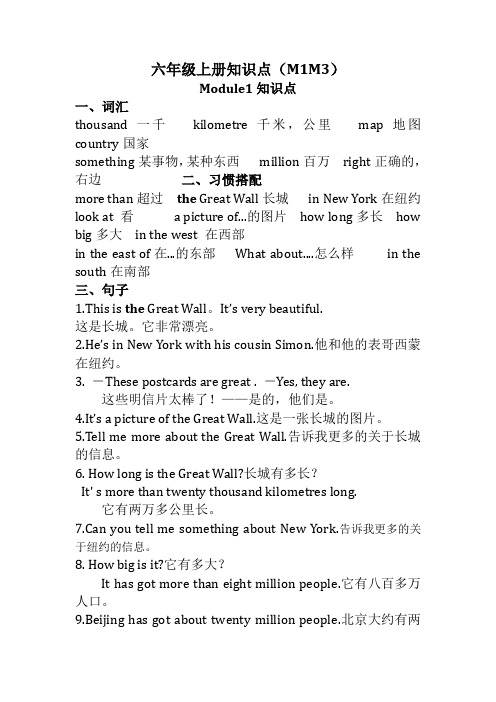
六年级上册知识点(M1M3)Module1知识点一、词汇thousand一千kilometre千米,公里map 地图country国家something某事物,某种东西million百万right正确的,右边二、习惯搭配more than超过the Great Wall长城in New York在纽约look at 看 a picture of...的图片how long多长how big多大in the west 在西部in the east of在...的东部What about....怎么样in the south在南部三、句子1.This is the Great Wall。
It’s very beautiful.这是长城。
它非常漂亮。
2.He’s in New York with his cousin Simon.他和他的表哥西蒙在纽约。
3. -These postcards are great . -Yes, they are.这些明信片太棒了!——是的,他们是。
4.It’s a picture of the Great Wall.这是一张长城的图片。
5.Tell me more about the Great Wall.告诉我更多的关于长城的信息。
6. How long is the Great Wall?长城有多长?It' s more than twenty thousand kilometres long.它有两万多公里长。
7.Can you tell me something about New York.告诉我更多的关于纽约的信息。
8. How big is it?它有多大?It has got more than eight million people.它有八百多万人口。
9.Beijing has got about twenty million people.北京大约有两千万人口。
深圳课改版六年级英语上册全册知识点汇总

深圳课改版六年级英语上册全册知识点汇总1. Unit 1: Greetings and Introductions- Greetings: Hello, Hi, Good morning, Good afternoon, Good evening.- Introductions: My name is..., I'm from..., I'm... years old.2. Unit 2: Colors and Numbers- Colors: red, blue, yellow, green, orange, purple, pink, brown, black, white.- Numbers: 1-20 (one, two, three, four, five, six, seven, eight, nine, ten, eleven, twelve, thirteen, fourteen, fifteen, sixteen, seventeen, eighteen, nineteen, twenty).3. Unit 3: School Life- Classroom objects: desk, chair, book, pen, pencil, eraser, ruler, notebook.- Subjects: English, Math, Science, Chinese, P.E., Art, Music.4. Unit 4: Daily Routine- Daily activities: get up, brush teeth, wash face, have breakfast, go to school, have classes, have lunch, do homework, play sports, watch TV, go to bed.5. Unit 5: Family- Family members: father, mother, brother, sister, grandfather, grandmother.- Describing family members: tall, short, old, young, thin, fat, kind, funny.6. Unit 6: Countries and Nationalities- Countries: China, America, Canada, Australia, France, Japan, Germany.- Nationalities: Chinese, American, Canadian, Australian, French, Japanese, German.7. Unit 7: Food and Drinks- Food: rice, noodles, bread, eggs, meat, fish, vegetables, fruits.- Drinks: water, milk, juice, tea, coffee.8. Unit 8: Time and Daily Activities- Time: o'clock, quarter past, half past, quarter to.- Daily activities: breakfast time, lunchtime, dinnertime, bedtime.9. Unit 9: Hobbies and Sports- Hobbies: reading, drawing, dancing, singing, playing musical instruments.- Sports: football, basketball, swimming, running, cycling.10. Unit 10: Weather and Seasons- Weather: sunny, rainy, cloudy, windy.- Seasons: spring, summer, autumn, winter.以上是深圳课改版六年级英语上册的知识点汇总。
六年级英语上册短语(1--3)

六年英语上册短语(1--3)1.walk to school 走路去学校39.walk south 向南走2.go by subway 坐地铁去40.walk wrong way 走错路3.the naure park 自然公园41.one is enough 一个足以4.traffic lights 交通灯42.too tart 太硬了5.traffic rules 交通规则43.look before you leap 三思而后行6.Stop at a red light 红灯停44.visit my grandparents 拜访我祖父母7.Wait at a yellow light 黄灯等45.look at 看… …8.Go at a green light 绿灯行46.bake a cake 烘烤面包9.the same in evry country 每个国家都相同47.take a trip 旅行10.drive on the right side 右侧行驶48.have a good day 玩得高兴11.drive on the left side 左侧行驶49.the Great Wall 长城12.on the left side 左边50.on weekend 在周末13.get to Pairs 到达巴黎51.learn kung fu 学功夫14.go to the bus stop 去公共汽车站52.read a mangazine 读杂志e to my house 来我家53.go to the cinema 去电影院16.next to the post office 在邮局旁边54.go to the supermarket跟妈妈一起去超市17.Remeber the traffic rules 记住交规 with my mother18.Mo turn left 禁止左转55.in the bookstore 在书店里19.turn right 右转56.plant trees 植树20.one way 单行道57.in the future 未来21.a fast food restsurant 一家快餐店58.walk on the moon 在月球上行走22.too expensive 太贵了59.going to be a soldier 成为一名士兵23.good exercise 好的锻炼60.want to be a computer xepert24.against the traffic rules 违反交规想要当一名电脑专家25.next to the cinema 在电影院附近61.in 20 years time 20年后26.go straight ahead一直走62.in the pool 在游泳池里27.in front of the school 在学校前63.learn by doing 实践见真知28.a dinosaur show恐龙展64.a 15 dollar fine15美元的罚款29.in the museum 在博物馆65.walk straight 直走30.turn left at the post office 在邮局左转66.get off at the hospital 在医院下车31.science museum科技博物馆67.take a look 看一看32.after school 放学68.have a good time玩得高兴33.a pair of shoe 一双鞋69.don't disturb me 别打扰我34.get to the post office 到达邮局70.the north gate of the park 公园北门35.take the No 12 bus 乘12路公交车71.go out of the east gate 出东门36.far from our school 离我们学校远72.take a plane 坐飞机37.my twelfth birthday 我的第12个生日73.go somewhere去某地38.walk east 向东走74.many ways 许多方式专家。
六年级知识点unit1-3
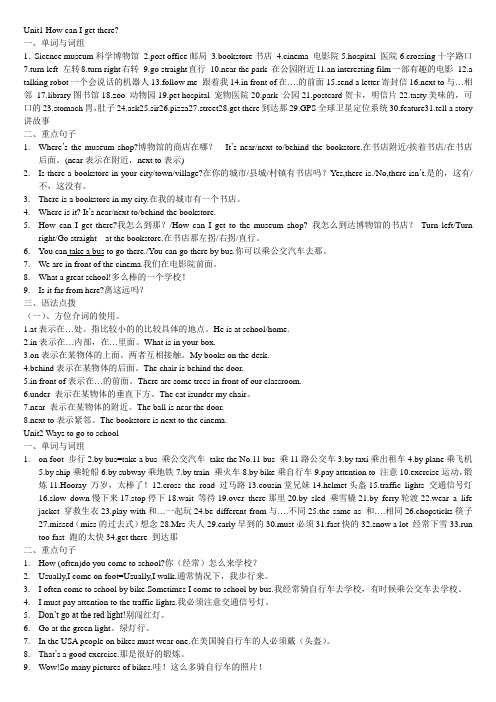
Unit1 How can I get there?一、单词与词组1.Sicence museum科学博物馆2.post office邮局3.bookstore书店4.cinema 电影院5.hospital 医院6.crossing十字路口7.turn left 左转8.turn right右转9.go straight直行10.near the park 在公园附近11.an interesting film一部有趣的电影12.a talking robot一个会说话的机器人13.follow me 跟着我14.in front of在….的前面15.send a letter寄封信16.next to与…相邻17.library图书馆18.zoo 动物园19.pet hospital 宠物医院20.park 公园21.postcard贺卡,明信片22.tasty美味的,可口的23.stomach胃,肚子24.ask25.sir26.pizza27.street28.get there到达那29.GPS全球卫星定位系统30.feature31.tell a story 讲故事二、重点句子1.Where’s the museum shop?博物馆的商店在哪?It’s near/next to/behind the bookstore.在书店附近/挨着书店/在书店后面。
(near表示在附近,next to表示)2.Is there a bookstore in your city/town/village?在你的城市/县城/村镇有书店吗?Yes,there is./No,there isn’t.是的,这有/不,这没有。
3.There is a bookstore in my city.在我的城市有一个书店。
4.Where is it? It’s near/next to/behind the bookstore.5.How can I get there?我怎么到那?/How can I get to the museum shop? 我怎么到达博物馆的书店?Turn left/Turnright/Go straight at the bookstore.在书店那左拐/右拐/直行。
六年级上册英语书1到3单元单词

六年级上册英语书1到3单元单词Unit 1 How can I get there?一、science museum([ˈsaɪəns mjuˈziːəm] 名词短语)1. science:科学;学科([ˈsaɪəns] 名词)2. museum:博物馆([mjuˈziːəm] 名词)二、post office([pəʊst ˈɒfɪs] 名词短语)1. post:邮政([pəʊst] 名词)2. office:办公室([ˈɒfɪs] 名词)三、bookstore([ˈbʊkstɔː(r)] 名词)四、cinema([ˈsɪnəmə] 名词)五、hospital([ˈhɒspɪtl] 名词)六、crossing([ˈkrɒsɪŋ] 名词)七、turn([tɜːn] 动词)1. left:左;左边([left] 名词;形容词;副词)2. right:右;右边([raɪt] 名词;形容词;副词)八、straight([streɪt] 形容词;副词)九、ask([ɑːsk] 动词)十、sir([sɜː(r)] 名词)十一、interesting([ˈɪntrəstɪŋ] 形容词)十二、Italian([ɪˈtæliən] 形容词;名词)1. restaurant:餐馆([ˈrestrɒnt] 名词)十三、pizza([ˈpiːtsə] 名词)十四、street([striːt] 名词)十五、get([ɡet] 动词)1. map:地图([mæp] 名词)Unit 2 Ways to go to school.一、on foot([ɒn fʊt] 介词短语)二、by([baɪ] 介词)1. bus:公共汽车([bʌs] 名词)2. plane:飞机([pleɪn] 名词)3. taxi:出租汽车([ˈtæksi] 名词)4. ship:船([ʃɪp] 名词)5. subway:地铁([ˈsʌbweɪ] 名词)三、slow([sləʊ] 形容词)四、down([daʊn] 介词;形容词;副词)五、slow down([sləʊ daʊn] 动词短语)六、stop([stɒp] 名词;动词)七、Mrs([ˈmɪsɪz] 名词)八、early([ˈɜːli] 形容词;副词)十、must([mʌst] 情态动词)十一、wear([weə(r)] 动词)十二、attention([əˈtenʃn] 名词)1. pay attention to([peɪəˈtenʃn tuː] 动词短语)十三、traffic([ˈtræfɪk] 名词)1. traffic lights([ˈtræfɪk laɪts] 名词短语)2. Munich([ˈmjuːnɪk] 名词)3. Germany([ˈdʒɜːməni] 名词)十四、sled([sled] 名词)十五、fast([fɑːst] 形容词;副词)Unit 3 My weekend plan.一、visit([ˈvɪzɪt] 动词)1. grandparents:(外)祖父母([ˈɡrænpeərənts] 名词)二、film([fɪlm] 名词)三、see a film([siːə fɪlm] 动词短语)四、trip([trɪp] 名词)五、take a trip([teɪk ə trɪp] 动词短语)六、supermarket([ˈsuːpəmɑːkɪt] 名词)七、evening([ˈiːvnɪŋ] 名词)九、tomorrow([təˈmɒrəʊ] 名词)十、next week([nekst wiːk] 名词短语)十一、dictionary([ˈdɪkʃənri] 名词)十二、comic([ˈkɒmɪk] 形容词;名词)1. comic book([ˈkɒmɪk bʊk] 名词短语)十三、word([wɜːd] 名词)十四、postcard([ˈpəʊstkɑːd] 名词)。
深港版六年级上英语基本知识点
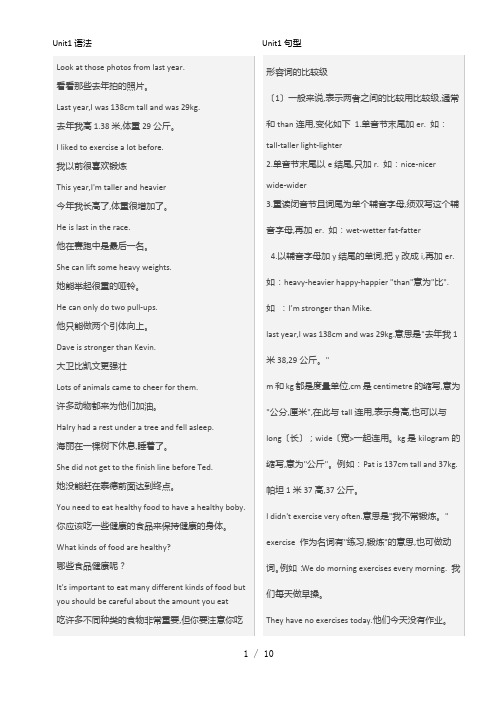
Unit1语法Look at those photos from last year.看看那些去年拍的照片。
Last year,I was 138cm tall and was 29kg.去年我高1.38米,体重29公斤。
I liked to exercise a lot before.我以前很喜欢锻炼This year,I'm taller and heavier今年我长高了,体重很增加了。
He is last in the race.他在赛跑中是最后一名。
She can lift some heavy weights.她能举起很重的哑铃。
He can only do two pull-ups.他只能做两个引体向上。
Dave is stronger than Kevin.大卫比凯文更强壮Lots of animals came to cheer for them.许多动物都来为他们加油。
Halry had a rest under a tree and fell asleep.海丽在一棵树下休息,睡着了。
She did not get to the finish line before Ted.她没能赶在泰德前面达到终点。
You need to eat healthy food to have a healthy boby. 你应该吃一些健康的食品来保持健康的身体。
What kinds of food are healthy?哪些食品健康呢?It's important to eat many different kinds of food but you should be careful about the amount you eat吃许多不同种类的食物非常重要,但你要注意你吃Unit1句型形容词的比较级〔1〕一般来说,表示两者之间的比较用比较级,通常和than连用,变化如下1.单音节末尾加er. 如:tall-taller light-lighter2.单音节末尾以e结尾,只加r. 如:nice-nicer wide-wider3.重读闭音节且词尾为单个辅音字母,须双写这个辅音字母,再加er. 如:wet-wetter fat-fatter4.以辅音字母加y结尾的单词,把y改成i,再加er. 如:heavy-heavier happy-happier "than"意为"比". 如:I’m stronger than Mike.last year,l was 138cm and was 29kg.意思是"去年我1米38,29公斤。
六年级上册第一单元至第三单元重点短语
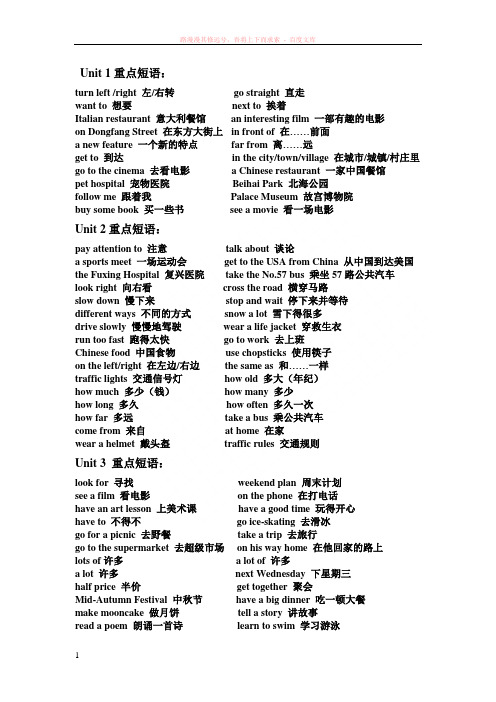
Unit 1重点短语:turn left /right 左/右转go straight 直走want to 想要next to 挨着Italian restaurant 意大利餐馆an interesting film 一部有趣的电影on Dongfang Street 在东方大街上in front of 在……前面a new feature 一个新的特点far from 离……远get to 到达in the city/town/village 在城市/城镇/村庄里go to the cinema 去看电影 a Chinese restaurant 一家中国餐馆pet hospital 宠物医院Beihai Park 北海公园follow me 跟着我Palace Museum 故宫博物院buy some book 买一些书see a movie 看一场电影Unit 2重点短语:pay attention to 注意talk about 谈论a sports meet 一场运动会get to the USA from China 从中国到达美国the Fuxing Hospital 复兴医院take the No.57 bus 乘坐57路公共汽车look right 向右看cross the road 横穿马路slow down 慢下来stop and wait 停下来并等待different ways 不同的方式snow a lot 雪下得很多drive slowly 慢慢地驾驶wear a life jacket 穿救生衣run too fast 跑得太快go to work 去上班Chinese food 中国食物use chopsticks 使用筷子on the left/right 在左边/右边the same as 和……一样traffic lights 交通信号灯how old 多大(年纪)how much 多少(钱)how many 多少how long 多久how often 多久一次how far 多远take a bus 乘公共汽车come from 来自at home 在家wear a helmet 戴头盔traffic rules 交通规则Unit 3 重点短语:look for 寻找weekend plan 周末计划see a film 看电影on the phone 在打电话have an art lesson 上美术课have a good time 玩得开心have to 不得不go ice-skating 去滑冰go for a picnic 去野餐take a trip 去旅行go to the supermarket 去超级市场on his way home 在他回家的路上lots of许多 a lot of 许多a lot 许多next Wednesday 下星期三half price 半价get together 聚会Mid-Autumn Festival 中秋节have a big dinner 吃一顿大餐make mooncake 做月饼tell a story 讲故事read a poem 朗诵一首诗learn to swim 学习游泳go to the swimming pool 去游泳池be afraid of 害怕this morning/afternoon/evening 今天早上/下午/晚上at noon 在中午after lunch 午餐之后Spring Festival 春节Recycle 1 重点短语:police station 警察局at the crossing在十字路口 wait for you 等你sing a song 唱一首歌a big ring 一只大戒指fall down 跌倒;摔破。
小学小学六年级英语上册1-3单元重点单词+句子
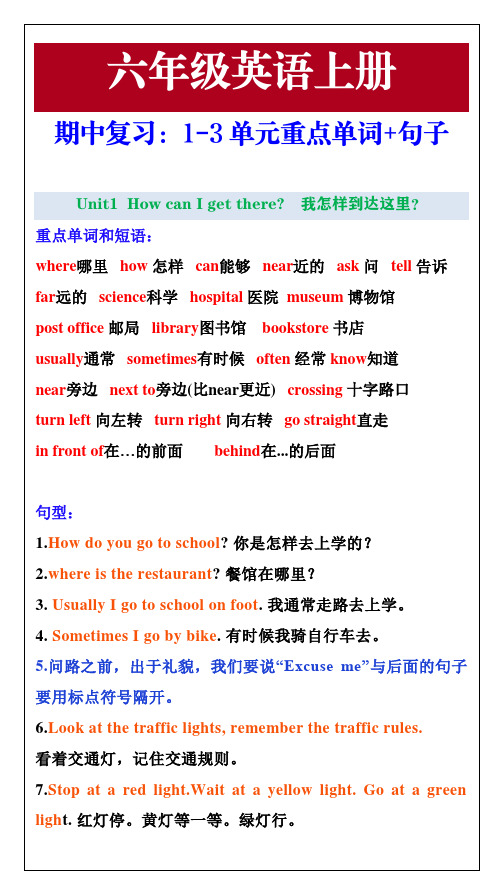
重点单词和短语:
by bike骑自行车by bus坐公车by train坐火车
by plane坐飞机by ship坐轮船by subway坐地铁
by taxi乘出租车on foot= walk走路excuse me打扰一下
please请buy买want to想要a pair of一双get on上车
next week下个星期tomorrow明天tonight今晚busy忙碌的
go home回家post card明信片comic book漫画书
newspaper报纸dictionary字典plant trees种树
句型:
1.---What are you going to do tomorrow?你明天打算做什么?
get off下车turn left左转turn right右转am上午pm下午
now现在look for寻找top停止wait等待get to到达
driver司机must必须
句型:
1.Let's go to the nature park.让我们一起去公园吧!
2.——How do we get there?我们怎样到达这里?
---I'm going to have an art lesson.我要上美术课。
--We are going to draw some pictures in Renmin Park.
我要到人民公园去画画。
2、--Where are you going?你们打算去哪儿?
-- We are going to the cinema.我们打算去电影院。
usually通常sometimes有时候often经常know知道
深圳小六英语上册 unit 1 --3复习
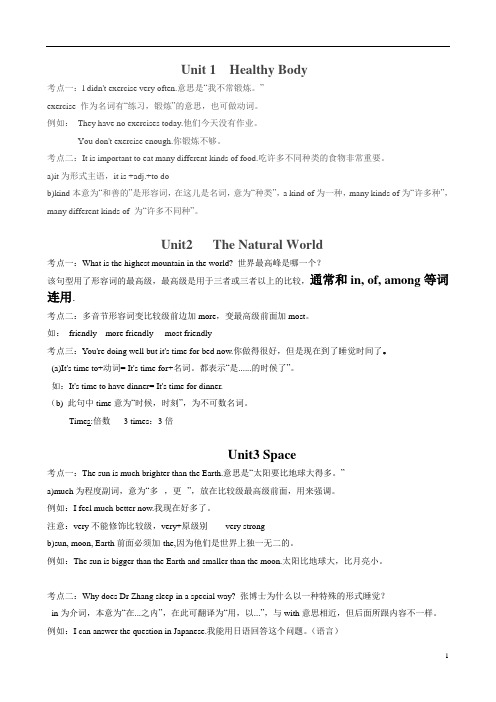
Unit 1 Healthy Body考点一:l didn't exercise very often.意思是“我不常锻炼。
”exercise 作为名词有“练习,锻炼”的意思,也可做动词。
例如:They have no exercises today.他们今天没有作业。
You don't exercise enough.你锻炼不够。
考点二:It is important to eat many different kinds of food.吃许多不同种类的食物非常重要。
a)it为形式主语,it is +adj.+to dob)kind本意为“和善的”是形容词,在这儿是名词,意为“种类”,a kind of为一种,many kinds of为“许多种”,many different kinds of 为“许多不同种”。
Unit2 The Natural World考点一:What is the highest mountain in the world? 世界最高峰是哪一个?该句型用了形容词的最高级,最高级是用于三者或三者以上的比较,通常和in, of, among等词连用.考点二:多音节形容词变比较级前边加more,变最高级前面加most。
如:friendly---more friendly----most friendly考点三:You're doing well but it's time for bed now.你做得很好,但是现在到了睡觉时间了。
(a)It's time to+动词= It's time for+名词。
都表示“是......的时候了”。
如:It's time to have dinner= It's time for dinner.(b) 此句中time意为“时候,时刻”,为不可数名词。
Times:倍数 3 times:3倍Unit3 Space考点一:The sun is much brighter than the Earth.意思是“太阳要比地球大得多。
六年级上册英语1~3单元单词句子
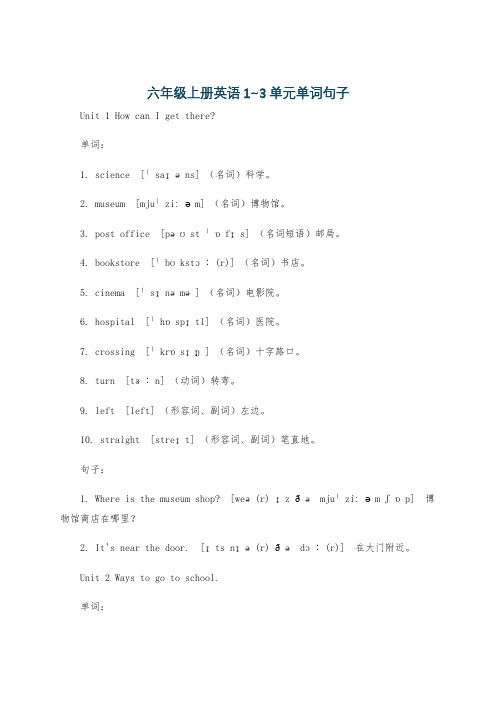
六年级上册英语1~3单元单词句子Unit 1 How can I get there?单词:1. science [ˈsaɪəns] (名词)科学。
2. museum [mjuˈziːəm] (名词)博物馆。
3. post office [pəʊst ˈɒfɪs] (名词短语)邮局。
4. bookstore [ˈbʊkstɔː(r)] (名词)书店。
5. cinema [ˈsɪnəmə] (名词)电影院。
6. hospital [ˈhɒspɪtl] (名词)医院。
7. crossing [ˈkrɒsɪŋ] (名词)十字路口。
8. turn [tɜːn] (动词)转弯。
9. left [left] (形容词、副词)左边。
10. straight [streɪt] (形容词、副词)笔直地。
句子:1. Where is the museum shop? [weə(r) ɪz ðə mjuˈziːəm ʃɒp] 博物馆商店在哪里?2. It's near the door. [ɪts nɪə(r) ðə dɔː(r)] 在大门附近。
Unit 2 Ways to go to school.单词:1. on foot [ɒn fʊt] (短语)步行。
2. by [baɪ] (介词)乘。
3. bus [bʌs] (名词)公共汽车。
4. plane [pleɪn] (名词)飞机。
5. taxi [ˈtæksi] (名词)出租汽车。
6. ship [ʃɪp] (名词)大船。
7. subway [ˈsʌbweɪ] (名词)地铁。
8. train [treɪn] (名词)火车。
9. slow [sləʊ] (形容词)慢的。
10. down [daʊn] (介词、副词)向下。
句子:1. How do you come to school? [haʊ duː juː kʌm tuː skuːl] 你怎么来学校的?2. Usually, I come on foot. [ˈjuːʒuəli aɪ kʌm ɒn fʊt] 通常我步行来。
- 1、下载文档前请自行甄别文档内容的完整性,平台不提供额外的编辑、内容补充、找答案等附加服务。
- 2、"仅部分预览"的文档,不可在线预览部分如存在完整性等问题,可反馈申请退款(可完整预览的文档不适用该条件!)。
- 3、如文档侵犯您的权益,请联系客服反馈,我们会尽快为您处理(人工客服工作时间:9:00-18:30)。
Unit 1
我喜欢I like
经常very often
最长的河流the longest river 表现良好be doing well
在比赛中in the race
最后一名be last
做引体向上do pull-ups
去年last year
举重lift weights
今年this year
有一场比赛have a race
懒惰be lazy
在上午in the morning
休息have a rest
睡觉fall asleep
在一棵树下under a tree
太迟了be too lazy
终点线finish line
到达get to
醒来wake up
太多了too much / too many
对…有害be bad for
对…有益be good for
Unit 2
在世界上in the world
最长的河流the longest river 最大的城市the largest city 休息have a rest
锦绣中华Splendid China
最长的城墙the longest wall 照相take a photo
玩得开心enjoy yourself
Unit 3
接近near to
远离be far from
其它the other
对…有害be bad for
一个好问题 a good question 那是…的原因that’s why
在空中in the sky
事实上in fact
在太阳系in the solar system 最…的…之一one of the…
太空站space station
研制药品make new medicines 在太空行走walk in space
在站外outside the station
休息have a rest
向外看look out of
每45分钟every 45 minutes 睡觉go to bed
漂走float away
睡个好觉have a good sleep
第一颗行星the first planet 小得多much smaller
谈论talk about
不得不have to。
